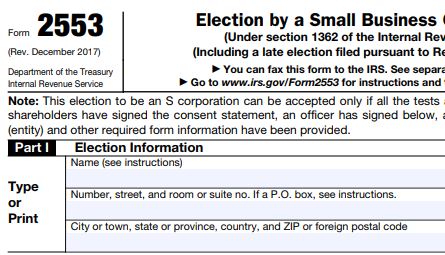Start filing Your s-corp

Ready to File Your S Corporation?...
...well you'll need to select from an LLC or C corporation first. Why? Because contrary to what most entrepreneurs have been told, an S corporation is not a business entity, rather it is an election that is made for tax treatment purposes after the LLC or C corporation has been formed. Both an LLC and a C corporation can elect to be treated as an S-Corp. As part of our LLC and C corporation business formation process, you'll have the opportunity to make the S-Corp election. (Don't worry, we'll help you file this paperwork too!) Not sure if your LLC or C corporation should make the S-Corp election? You'll have up to 75 days to decide once your business is formed so you don't have to make the decision today. If you would like to read more about making the S-Corp election, review the "S-Corp FAQ" section below. If you're ready to file your business, select from the options below.
S Corporation Frequently Asked Questions
Most Frequently Asked S Corporation Questions and Answers
What is an S corporation?
Contrary to what most business owners have been told, an S corporation (also known as “S-Corp”) is not a type of business structure, rather it is an election that is made to have your LLC or C Corporation treated as an S Corporation for tax purposes. Both an LLC and a Corporation can elect to be treated as an S corporation. Making the S-Corp election requires documentation to be completed with the IRS, not the state in which you are incorporating your business. (Don’t worry, we’ll help you file this paperwork too!)
What types of business structures can elect to become an S-Corp?
LLCs and C corporations can elect to be treated as an S-Corp for tax purposes. The legal structure of the business will still be considered an LLC or C corporation. Sole Proprietors and Nonprofit corporations cannot elect S-Corp status.
What types of LLCs or Corporations cannot elect an S-Corp tax status?
To qualify for S corporation status, the LLC or C corporation must meet the following requirements:
- Be a domestic corporation (i.e. conducts its affairs in the United States)
- Have only allowable shareholders
- May be individuals, certain trusts, and estates and
- May not be partnerships, corporations or non-resident alien shareholders (Shareholders must be U.S. citizens or resident aliens)
- Have no more than 100 shareholders
- Have only one class of stock
- Not be an ineligible corporation (i.e. certain financial institutions, insurance companies, and domestic international sales corporations do not qualify).
What is the default tax treatment of a LLC and when should I consider making a S corporation election for tax purposes for my LLC?
By default, an LLC is considered a “disregarded entity” by the IRS and is taxed like a sole proprietorship if the LLC has a single member (owner), or a partnership if the LLC has two or more members (owners).
An LLC also has the option to be treated as an S corporation for tax purposes. The legal entity will still be an LLC but the tax structure will be an S corporation. Electing to be treated as an S corporation for tax purposes is generally a tax savings strategy that should be put in place only after consulting with a competent tax accountant. In general, businesses that will have greater than $30k a year in net profit (revenue minus all expenses and deductions) should consider making an S corporation election for tax purposes. You can make this election up to 75 days after you form your LLC so you have some time to consider this after filing your business. Additionally, you can operate as an LLC with the tax structure of a sole proprietor or partnership and make the S corporation election in a future tax year when it makes financial sense for your unique situation.
What is the default tax treatment of a C corporation and when should I consider making an S corporation election for tax purposes for my C corporation?
By default, a C corporation is subject to double taxation (the C corporation pays taxes on the profits and then the shareholder(s) also pay taxes on the dividends received).
A C corporation also has the option to be treated as an S corporation for tax purposes. The legal entity will still be a C corporation but the tax structure will be an S corporation. Electing to be treated as an S corporation for tax purposes is generally a tax savings strategy that should be put in place only after consulting with a competent tax accountant. In general, an S corporation will pay less taxes than a C corporation. You can make this election up to 75 days after you incorporate your C corporation so you have time to make this election after filing your business with the state. Additionally, you can operate as a C corporation with the tax structure of a corporation (subject to double taxation) and make the S corporation election in a future tax year. To qualify for S corporation status, the corporation must meet the requirements discussed in the FAQ above, “What types of LLCs or Corporations cannot elect an S-Corp tax status”.
How do I make the S corporation election from my LLC or C Corporation?
The S corporation election is made by filing paperwork with the IRS, not the state in which you are filing your business structure with. Fileyoubusiness.com will assist you with making the S corporation election while establishing your LLC or C corporation. If you are uncertain about making the S corporation election at the time you are incorporating your business, you have 75 days to seek counsel from an accountant and make the election. Fileyourbusiness.com can assist you if you decide to make the S corporation election after you have used our business formation services click here to get started.


